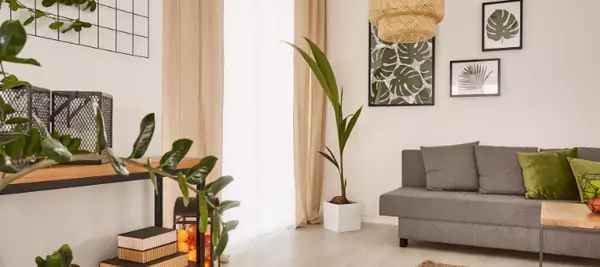Mental Health and Your Home
Mental Health and Your Home.

If you had a broken leg, you would make adjustments to your home to make things easier and promote healing. The same goes for your mental and emotional health.
Mental illness comes in a vast array of different types with differing levels of intensity. The following isn't meant to replace the work done by a professional therapist, psychologist, or psychiatrist. The following is simply a series of little tips and tricks to improve the home environment around you or that of someone you care for.
Psychological well-being is a complex topic but mental health and real estate a closely linked on a few different levels. Here, we'll look at housed individuals trying to better their situation.
What role does your home play in your mental health?
This does not apply to all neurodivergent people but your inner state of mind can manifest in your surroundings.
Depression can make it hard to care for the space around you and removing clutter can actually mean making the floor visible and taking out long overdue trash.
The disconnect that accompanies many forms of depression creates an environment that reinforces stress and anxiety.
Taking out the trash and doing the dishes won't solve everything and it would be irresponsible to suggest that it would. But, doing those things, taking care of the space around you can help you feel calmer and more in control of the space you occupy. This is actually reflected in brain chemistry: people that live in chaotic environments tend to create more of the stress hormone cortisol.
It's easier to build up your self-confidence when you don't have to skirt around mounds of clothes to make a cup of tea.
Deep breathing and an uplifting song have their place to help improve your mental health but so does being in a home where you can breathe deeply without smelling undone dishes and maybe even sway around to that uplifting song.
Practical tips to keep your home clean and usable if you have mental health issues.
A lot of tips out there feature tips that work toward a nebulous idea of feeling good. Though well-intended, they don't provide practical tips and tricks to help people function on a daily basis.
Many tips and tricks articles stress the importance of a "brain-healthy diet" but not many deal with how to remember to use ingredients before they spoil.
The quick and simple option is the one people gravitate to when they feel overwhelmed but when that happens too often it means that ingredients go bad and thus to waste.
The actual trick to having a diet full of fatty fish, fresh fruit, and leafy greens is twofold. Energy levels of neuro-atypical people can vary wildly depending on the condition and its severity. One of the most effective ways to combat food waste is to streamline the preparation process.
A little bit of preparation and easily realized recipes can create a simple, almost automatic, process to make meals for a long period of time. Prepared meals can then be refrigerated for days where stress levels are higher or when the ability to focus is a problem.
Your pantry can also be rearranged to create a simple order of operations for meal preparation or for quick snacks.
Another part of your home that can suffer is cleanliness. Dust and hair accumulate, dishes pile up - but how can you make it easier to tackle these things? Remove barriers; place the vacuum in the room you use the most, change its position so it blocks the door if you have to, place your phone on the kitchen by the sink while it's playing something on Netflix so that your hands wander to the dishes. The solution differs from person to person - keep trying to find ways in which you can trick your brain to perform a task by removing the barriers leading to said task.
Put the trash bin in front of the door you need to use to get out, get big colourful post-it notes that get in the way of you performing the daily tasks that you can do so that you're forced to pay attention to them.
How to make your home a healthy and happy place to live.

Joy is not out of reach for the neuro-atypical. The current trend right now is telling people to practice mindfulness meditation - and if it works for some, good but it's often not enough or does not work at all.
A stress ball will help your average stressed-out person but to boost moods in the long term there are other things that can have a greater effect. Whether you have a green thumb or not, an easy to care-for plant will have lasting positive effects on your mental health.
One thing to keep in mind though is that different plants have different textures. People that have an overtuned sensory input cannot stand certain textures and smells, so the stress-busting plant may have the opposite of the intended effect for example. This is also a reason why simply flooding an area with bright lights is not a good idea.
It's not being picky or difficult, for some people with mental health issues, it's just the way their brain works.
The importance of natural light.
Pulling back the curtains is a legitimately good thing to do, especially in the winter. Seasonal Affective Disorder (SAD) affects people who live in colder climates because of the lack of sunlight. Quality time in the sun does not just help out your immune system, it can boost your mental health.
The mood-boosting power of sunlight has to do with vitamin D. It stabilizes your mood and helps lessen the effects of depression. Two hours a day of sunlight absorbed by the skin is usually enough to boost someone's mood and calm their feelings. Of course, it's sadly not a cure-all.
So, how do you make the best of sunlight in your home? Place your desk in the path of the sun's natural course and roll up your sleeves. At first, it may not feel like it but after some time, the benefits start to become noticeable. If you plan to sit at a desk all day in your room, you might as well do something to get on the track to a better mental health state.
Speaking of tracks and sitting at a desk all day.
Regular exercise, how to make it possible.
Exercise has a plethora of health benefits but actually getting exercise done can feel like pulling teeth, especially for neuro-atypical people.
It can relieve stress, helps you gain control over your body and body image, and you can even reward yourself with a warm bath after - what's not to love? Well, the overwhelming sense of pointlessness that accompanies many mental health issues.
Whether you're hyperfocused on something because of ADHD or ruminating on the pointlessness of owning tennis shoes because of depression, taking steps to improve your life through exercise is a strange notion.
The way to overcome the unfortunate natural barriers in your way is to remove as many barriers as possible from the other aspects of your life. Lay your workout clothes on your bed the moment you remember to do so, hide your work shoes somewhere impractical and keep your running shoes by the door.
Exercise can make such a big difference in the life of everyone especially neuro-atypical people that no tactic is too silly if it works.
Creating a peaceful and relaxing environment at home.

To enjoy life doesn't just mean pushing yourself to do uncomfortable things. Sometimes a softer approach is the better approach.
Sensory overload, for example, is something you can combat by delineating an area of your house as a quiet zone where it makes it easier for someone with ADHD to feel calm after being overstimulated.
Of course, maintaining good relationships between family members and friends doesn't mean overtaking shared spaces but things like quiet zones can help relieve stress for everyone.
Mental and emotional health is something that has been often overlooked by many people and misunderstood by many more. Being able to talk to others and confide about anxiety, relationships, or just forming bonds is something that can help you manage stress. Simply voicing your concerns and bouncing ideas back and forth does feel good, and it works to improve your mood.
A peaceful living space is a way to boost your mental health and that of others around you. Lower stress levels are key to things like sleep and help improve memory function.
While these tips help...
The tweaks that you can implement can have a huge boost on your well-being and your nervous system, but they don't replace professional care. Natural light, space, exercise will boost your mental health but if you are not diagnosed with a mental health condition yet and feel like these are not helping as much as they should, seeking professional help is a great idea.
Sadly, many professional services are too expensive for many people. That's why starting with the home environment can help bolster your well-being either until a bad episode passes or you're able to see a mental health professional.
View All Homes For Sale in Greater Vancouver >>>
About Search Home Listings
SearchHomeListings.ca has simplified the home buying and selling process by giving you superior tools with up-to-the-minute information including active homes for sale, sold homes, market reports, and a home valuation tool! We have a team of success managers on standby to support you with setting up your saved home search and agents ready to take you out on a tour. Tap into our industry experts from inspectors, to contractors to interior designers to provide you with the best prices and service possible. Everyone attached to our website has been rigorously vetted and is made up of caring, knowledgeable professionals that work tirelessly to help you to make your home buying experience as stress-free as possible. Contact us today to see how we can help!
Sites We Follow
Categories
Recent Posts










